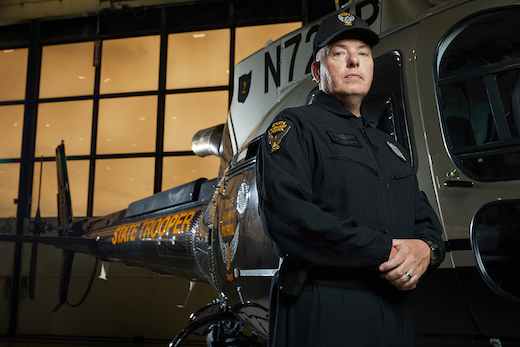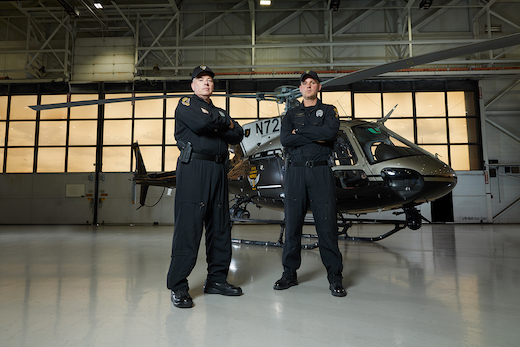|
Nov
30
2022
|
|
Posted 3 years 84 days ago ago by Admin
|
|

FlightSafety International’s name and reputation in aviation training has been built over seven decades. But the truest test of that value comes when pilots are facing split-second decisions, and their training takes over.
In one pilot’s case, FlightSafety training and how it prepared him for anything, are the reasons he believed he and his crew survived a dangerous situation.
Sgt. David Sizemore had seen a lot in his more than 13,000 flight hours. But during a December 2020 flight in his Ohio State Highway Patrol helicopter, he faced the biggest challenge as a pilot.
Encountering inadvertent instrument meteorological conditions (IIMC) – occurring suddenly after a successful mission assisting law enforcement – required Sizemore to react quickly to the emergency situation. His immediate actions would make the difference in he and his crewmember returning home safely.
Sizemore responded with confidence.
“I immediately focused on keeping my situational awareness,” he said. “My training with FlightSafety kicked in. I knew how to handle the situation and due to the recent training, that I could rely on my tactical flight officer (TFO) to assist.”
“Had we not trained together at FlightSafety, I’m not sure we would be here now.”
Sizemore’s experience reinforces that even highly skilled officers who have been trained to respond quickly and appropriately in times of extreme stress benefit from FlightSafety rotorcraft training. It doesn’t just take you to proficiency, but to preparedness. For any situation.
Reality-Based Simulator Training
Pilots coming to FlightSafety receive tailored training from the best instructors in the business, who are dedicated to their success and strive to take their piloting skills beyond regulatory minimums.
FlightSafety training challenges pilots, knowing that there is always something valuable in tackling the next scenario. The fundamentals are never skipped, but training goes deeper, examining events that may happen, based on pilot experience or real-operational flying data. When systems fail or conditions deteriorate, FlightSafety makes sure the pilot has something to rely on – effective training to increase the likelihood of success.
Of course, this base of knowledge is developed through cutting-edge full-flight simulators and advanced-technology reality replication. There are many scenarios where simulation is the only way to expose pilots to things too risky to encounter in-flight.
Simulator training can be paused during scenarios, for detailed instruction and corrections. It can be reset so the pilot can fly the maneuver or approach again, putting the focus on efficient training without burning fuel or putting people or the aircraft in jeopardy.

Better Communications Through Preparation
Prior to 2019, Sizemore had done most of his training either in an aircraft or on a lower-tech training device. That year, he was able to attend FlightSafety’s Denver Learning Center for his recurrent training on the Airbus H125 (AS350) helicopter. And as part of a new program for the Highway Patrol, his tactical flight officer (TFO), Taylor Vogelmeier, was able to attend as part of full crew training to better prepare communications and handle emergency situations.
Even for a veteran pilot, Sizemore saw the benefits of training on a Level D AS350 simulator immediately.
“The quality was so much better than what I’ve seen before,” he said. “The visuals, the motion – all replicated what it was like better than anything I had used before. It went well beyond introductory training.”
“We didn’t want the first time our tactical flight officers were going to experience anything out of the norm to be an actual emergency. That might be the first time that you’ve ever had that type of stress thrown at you. This training gave us confidence to handle it.”
That level of preparedness is the standard, said Andrew Bright, FlightSafety’s Denver Learning Center director. Instructors develop training scenarios based on real-life situations.
In this case, one instance was specifically inadvertent IMC.
“That’s always a stress point, because so many of these helicopter crews are VFR only,” Bright said. “In an EMS (emergency medical services) or LEO (law enforcement operations) situation, you might be flying from one point to another and come over a ridgeline. You had plenty of cloud clearance, but suddenly you don’t and what’s going to be your response at that time?”
Constructive feedback happens in the moment, not just an hour afterward in the debrief. Those little bits of valuable information and training aren’t lost or forgotten between the flight and the classroom.
Coming Home From Danger
In that 2020 flight, Sizemore and TFO Vogelmeier had just completed a successful search for a suspect. They coordinated with troopers on the ground in Ohio’s southeast section – the hilliest and darkest portion of the state.
After the search concluded, Sizemore turned north for refueling at the intended airport in Athens, Ohio. Just a few miles away, the reportedly clear conditions without clouds deteriorated, leaving Sizemore and the helicopter visually blind in a cloud.
“Your instinct is to dive below, but the training says that’s not the best course of action,” Sizemore said.
Vogelmeier immediately recognized the danger they were in and jumped into action, as they had trained for. He provided Sizemore with altitude, airspeed, pitch and bank information, to help coordinate their safe descent. They turned off law enforcement radios, cutting out distractions.
Together, Sizemore and Vogelmeier slowly and methodically maneuvered to visual meteorological conditions (VMC), a little bit at a time, leveling out and stabilizing the aircraft repeatedly before descending.
With the tools they had, the unshakable team returned to VMC conditions. They landed safely. They were able to be with their families at Christmas.
“I was thinking about just a few months before a medical helicopter went down in that same area when they experienced a snowstorm that wasn’t supposed to be there,” he said. “Our clouds weren’t supposed to be there either.”
Sizemore said it’s not every day that one gets to see the value of preparation in an event outcome. He did that December day.
“The training literally just saved our lives.”
#sponsored
READ MORE ABOUT FLIGHTSAFETY INTERNATIONAL
READ MORE ROTOR PRO SEP/OCT ISSUE
READ MORE ROTOR PRO: https://justhelicopters.com/Magazine
WATCH ROTOR PRO YOUTUBE CHANNEL: https://buff.ly/3Md0T3y
You can also find us on
Instagram - https://www.instagram.com/rotorpro1
Facebook - https://www.facebook.com/rotorpro1
Twitter - https://twitter.com/justhelicopters
LinkedIn - https://www.linkedin.com/company/rotorpro1